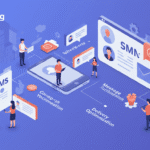As organizations look to improve the competency and 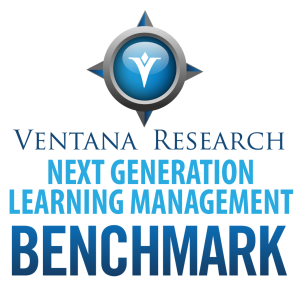 skills of their workers, learning management system (LMS) technology can help improve their efforts.
skills of their workers, learning management system (LMS) technology can help improve their efforts.
As organizations look to improve the competency and  skills of their workers, learning management system (LMS) technology can help improve their efforts. Our latest benchmark research innext-generation learning management systems finds a range of progress in this regard. Our Performance Index analysis places organizations almost evenly between the two lowest (51%) and the two highest (49%) of four levels of performance. The results differ by size of company as measured by number of employees. For example, only 8 percent of small companies reach the highest Innovative level of performance, compared to 26 percent of very large companies, the largest percentage of any size. Analyzed by industry, the Finance, Insurance and Real Estate sector performs best: Two out of three (65%) are at the top two levels. We attribute this in part to the finance industry’s focus on processes and its need to comply with regulations and teach employees how to do so.
skills of their workers, learning management system (LMS) technology can help improve their efforts. Our latest benchmark research innext-generation learning management systems finds a range of progress in this regard. Our Performance Index analysis places organizations almost evenly between the two lowest (51%) and the two highest (49%) of four levels of performance. The results differ by size of company as measured by number of employees. For example, only 8 percent of small companies reach the highest Innovative level of performance, compared to 26 percent of very large companies, the largest percentage of any size. Analyzed by industry, the Finance, Insurance and Real Estate sector performs best: Two out of three (65%) are at the top two levels. We attribute this in part to the finance industry’s focus on processes and its need to comply with regulations and teach employees how to do so.
We also analyze performance by four dimensions: People, Process, Information and Technology. In this research, participants perform best in the People (74% at the two highest levels) and Technology (53%) dimensions. Conversely, more than half rank at the two lowest levels for Process (55%) and Information (62%). 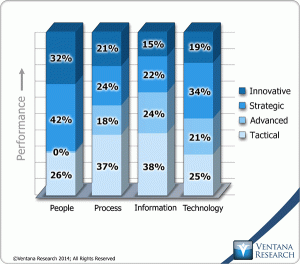 We attribute this difference to the existence of people-centered learning programs and the core technology components for learning management.
We attribute this difference to the existence of people-centered learning programs and the core technology components for learning management.
Learning management systems have existed in various forms for many years, yet the research finds that a significant number of organizations participating in this research have not adopted this technology. Although nearly two in three (63%) have a training department responsible for learning management, only about half (53%) have a learning management system. Moreover, a formal approach to learning management correlates with size of company: The numbers of those that have a training department rise at each size level, from 25 percent of small organizations to 100 percent of very large ones. There is a corresponding increase in the number that have learning management systems (small 28%, very large 92%). Because larger organizations have more employees, they likely wish to train them uniformly and more often have resources to devote to this function. Most organizations of all sizes said the primary purpose of the learning management system is employee development training (46%) or compliance-related learning (29%). The use of an LMS automate learning processes and be more efficient in their operations.
Also, learning management systems can contribute to the effectiveness of other employee-related systems including human resources management (HRMS) and talent management. Organizations can gain a more complete view of employees, their performance and what they learn by applying their learning management systems to worker activities. The research shows that most have not done such integration, but some have connected learning management to closely related HR business processes like employee development (35%), which the research shows is the primary purpose of their learning management programs for nearly half of organizations. Performance management (33%) and employee onboarding (27%) are the processes to which they have connected learning management next most often.
Integrating the learning management and performance review processes also makes sense in that the benefit of learning management most often cited (by 72%) is to create more effective workers. Three out of four (77%) of those connecting the two processes are satisfied or somewhat satisfied with how they link learning management and performance reviews. Looking ahead, the research finds double-digit percentages of organizations planning to connect learning management with other HR business processes in the next 12 months and similar percentages planning to do so within 24 months.
Effective learning management requires content to educate 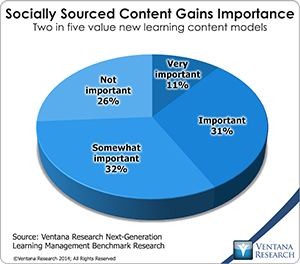 those who engage with the system. Yet one of the costliest aspects of a learning program is the acquisition and management of content. For years this has been handled by specialists using purpose-built tools. A new technology capable of alleviating some of this cost is the massive open online course (MOOC) model. The research shows that employees in 40 percent of organizations use MOOC technology as a source of content and courses; however, only 10 percent have MOOC linked to their learning management system, while the rest access it independently. Another emerging option is socially sourced content, which has the potential to reduce dramatically the cost of content development. Two in five (42%) organizations said that using this source is important or very important to their learning content management strategy; just one-fourth said it is not important. Currently most (46%) get no more than one-fourth
those who engage with the system. Yet one of the costliest aspects of a learning program is the acquisition and management of content. For years this has been handled by specialists using purpose-built tools. A new technology capable of alleviating some of this cost is the massive open online course (MOOC) model. The research shows that employees in 40 percent of organizations use MOOC technology as a source of content and courses; however, only 10 percent have MOOC linked to their learning management system, while the rest access it independently. Another emerging option is socially sourced content, which has the potential to reduce dramatically the cost of content development. Two in five (42%) organizations said that using this source is important or very important to their learning content management strategy; just one-fourth said it is not important. Currently most (46%) get no more than one-fourth 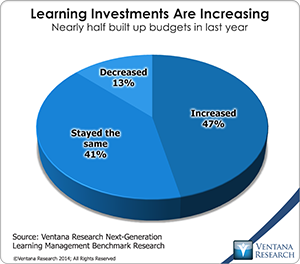 of their content from social collaborative sources, but in the next 12 to 24 months 30 percent of organizations expect up to half of all learning content to come from such sources.
of their content from social collaborative sources, but in the next 12 to 24 months 30 percent of organizations expect up to half of all learning content to come from such sources.
Learning management and employee training is a widespread corporate function, and the research finds that 70 percent of organizations have an annual budget for it. In nearly half (47%) of those the budget has increased in the past 12 months; in only 13 percent has it decreased. Thus the opportunity for further investment in learning management exists, as having a budget is the top-ranked consideration (placed first by 15%) for building a business case; among job functions, executives (23%) ranked budget as most important more often than others. Among those ranked first or second in importance, having a budget and ensuring executive sponsorship tied for the top consideration (28% each). These two factors should be considered in tandem.
Organizations building a business case can find key benefits in learning management systems; the most-often found in the 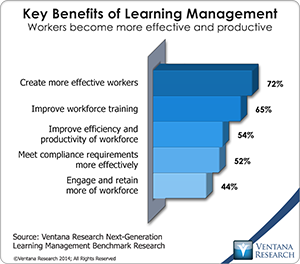 research are creating more effective workers (by 72%), improving worker training (65%) and improving the efficiency and productivity of the workforce (54%). Engaging and retaining more of the workforce was cited by 44 percent overall, but more executives (60%) and management (vice presidents, 75%) chose this, reflecting their positions in the organization and value of this benefit.
research are creating more effective workers (by 72%), improving worker training (65%) and improving the efficiency and productivity of the workforce (54%). Engaging and retaining more of the workforce was cited by 44 percent overall, but more executives (60%) and management (vice presidents, 75%) chose this, reflecting their positions in the organization and value of this benefit.
Learning management systems have the potential to transform training organizations by increasing employees’ effectiveness in their jobs and preparing them to act according to their company’s policies and rules. Linking a learning management system to other human capital management processes and tools can bring a tighter connection between people and performance that can result in positive outcomes. Organizations seeking to prepare their workforces better for their roles should examine how the next generation of LMS can help them achieve this goal.




